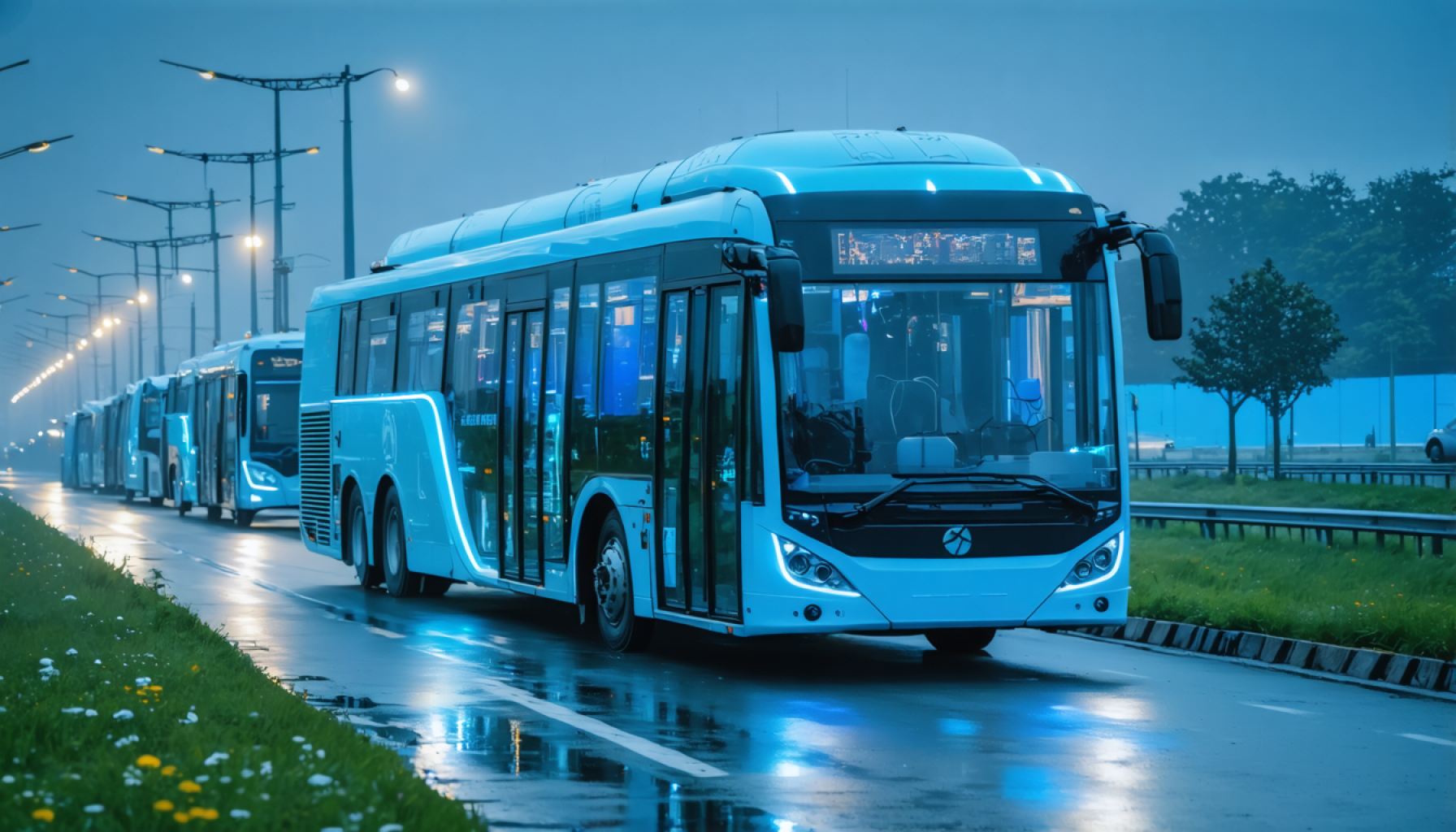- Hexagon Purus leads in zero-emission transit solutions with groundbreaking hydrogen technology.
- Secured a EUR 2.4 million order from bus manufacturer MCV to supply hydrogen fuel storage systems.
- Hydrogen fuel-cell electric buses are set to operate across European cities, reducing emissions and enhancing air quality.
- Collaboration highlights a pivotal step towards urban decarbonization and addressing climate change.
- Hydrogen’s zero-emission profile and energy efficiency make it an appealing transit solution globally.
- Strategic alliance reflects a shared commitment to sustainable transportation and environmental stewardship.
- Hexagon Purus’s innovation in hydrogen technology sets a benchmark for renewable energy solutions.
- This initiative exemplifies the transformative potential of hydrogen as a core component of modern transit.
A remarkable journey toward a sustainable future is unfolding on the streets of Europe. In a groundbreaking venture, Hexagon Purus, a vanguard in zero-emission mobility, stands at the helm, steering a new wave of eco-friendly transit solutions. The company has secured its inaugural purchase order from MCV, a prominent force in bus manufacturing across the Middle East and Africa. This significant order, valued at approximately EUR 2.4 million, sets the stage for an energy transformation that promises to reshape European public transportation.
From their advanced facility in Kassel, Germany, Hexagon Purus is poised to craft cutting-edge hydrogen fuel storage systems that will soon breathe new life into MCV’s hydrogen fuel-cell electric buses. These buses are set to traverse European cities, offering a clean and efficient alternative to traditional public transportation methods. This joint effort symbolizes a critical step toward decarbonizing urban environments, as cities across the globe scramble to reduce emissions and tackle climate change.
The allure of hydrogen-powered transit is gaining momentum, driven by the global imperative for sustainable practices. Hydrogen, with its zero-emission profile and robust energy efficiency, is becoming an attractive solution for cities burdened by pollution and the pervasive challenges of climate change. The demand for hydrogen-fueled vehicles is accelerating as it seamlessly integrates into existing infrastructure, offering a tangible path to reducing the carbon footprint.
Hexagon Purus’s expertise in hydrogen technology is pivotal. With years of innovation behind them, the company continues to shape the landscape of renewable energy solutions. By converting hydrogen into a practical energy source for urban transit, they are not only improving air quality but also setting a standard for other regions contemplating similar shifts.
Amid all this, Hexagon Purus’s alliance with MCV marks not just a business venture but a shared commitment to environmental stewardship. The collaboration underscores a vision to make sustainable transportation the norm rather than the exception. As cities evolve and embrace greener modes of transport, the synergy between Hexagon Purus and MCV serves as a beacon of possibility, highlighting the power of partnerships in pursuing a cleaner future.
In essence, this undertaking is more than a transaction; it’s a testament to the potential of hydrogen as a cornerstone of modern transit solutions. With groundbreaking technology at its core, Hexagon Purus and MCV are on the front lines of transforming our world—a world where buses whisper through city streets, powered by the abundant, invisible force of hydrogen, leaving a legacy of cleaner air and brighter tomorrows.
Hydrogen-Powered Buses: The Future of Clean Urban Transit
Understanding the Benefits and Challenges of Hydrogen Fuel in Public Transportation
Hydrogen as a Game-Changer in Public Transport
Hexagon Purus and MCV’s partnership represents a significant advancement in the adoption of hydrogen technology in public transportation. Here’s why hydrogen is being embraced:
1. Emissions-free Energy: Hydrogen buses produce only water vapor as a byproduct, eliminating harmful pollutants like nitrogen oxides and particulate matter associated with diesel buses.
2. Energy Efficiency: Fuel cells are typically more efficient than combustion engines, converting a higher percentage of energy into usable power.
3. Refueling Speed: Unlike electric buses, which require hours to recharge, hydrogen buses can refuel in just minutes, making them more suitable for continuous operation.
4. Longer Range: Hydrogen buses often have longer travel ranges between refueling compared to electric buses, making them ideal for longer routes.
Challenges of Hydrogen in Urban Transit
Even with these advantages, hydrogen power does not come without challenges:
– Infrastructure Needs: Establishing hydrogen refueling stations requires significant investment and space, posing logistical challenges, especially in densely populated cities.
– Production Costs: Currently, the production of green hydrogen (via renewable energy) is more expensive compared to gray or blue hydrogen, which involves the use of fossil fuels and emits CO₂.
– Storage Constraints: Hydrogen storage technologies are still evolving, with existing solutions requiring high pressure or low temperatures, increasing complexity and cost.
Market Trends and Predictions
The market for hydrogen fuel cell technology is projected to grow rapidly. The global hydrogen fuel cell vehicle market size was valued at USD 1.17 billion in 2020 and is expected to grow at a compound annual growth rate (CAGR) of 66.9% from 2021 to 2028, according to Grand View Research.
Real-World Use Cases
Cities like Hamburg, London, and Los Angeles have already introduced hydrogen buses in their transit systems, learning valuable lessons about infrastructure development and operational logistics. These cities serve as case studies for other regions considering hydrogen buses.
Pros & Cons Overview
– Pros: Zero emissions, quick refueling, high energy efficiency, reduced noise pollution.
– Cons: High initial investment, limited infrastructure, production costs, storage challenges.
Actionable Recommendations
– Policy Making: Encourage governments to support hydrogen infrastructure through subsidies and incentives.
– Public Awareness: Increase public and stakeholder awareness about the benefits of hydrogen technology.
– Research & Development: Invest in R&D to improve hydrogen production, storage, and fuel cell technologies.
Quick Tips for Cities and Transit Authorities
– Integrate: Consider a phased integration of hydrogen buses to assess feasibility and build infrastructure incrementally.
– Partnerships: Collaborate with private companies and other cities to share knowledge and resources.
– Incentives for Growth: Explore financial incentives for companies developing hydrogen solutions.
For more information on zero-emission mobility and hydrogen technology, visit Hexagon Purus and MCV.
